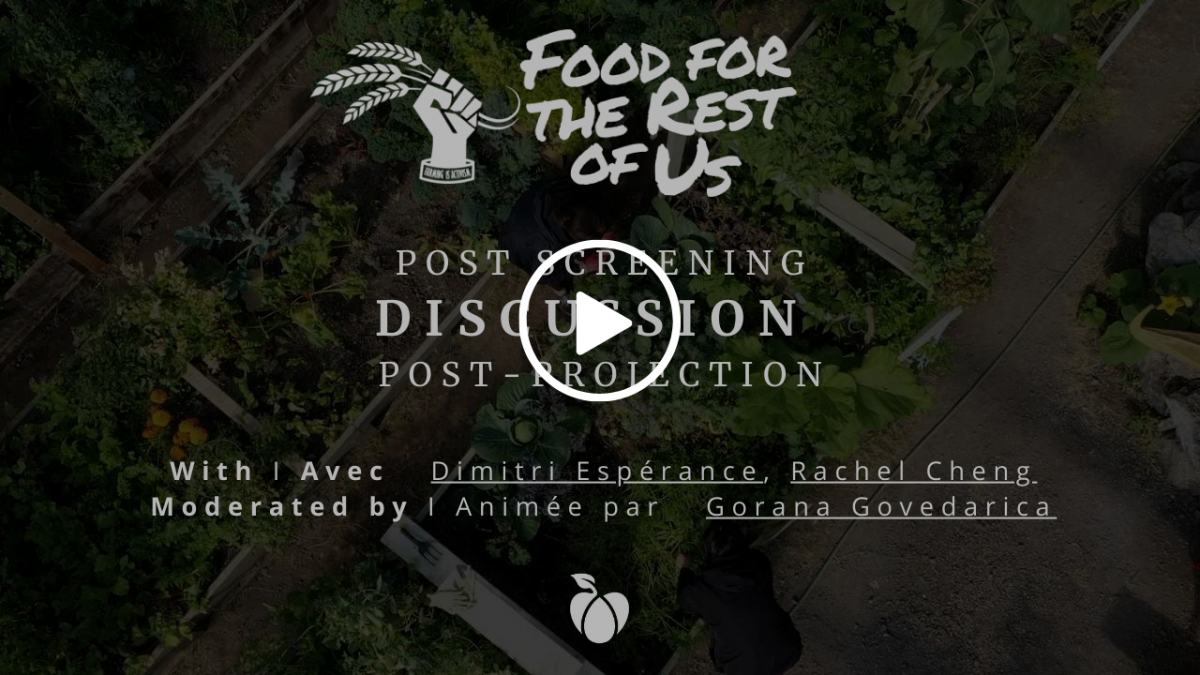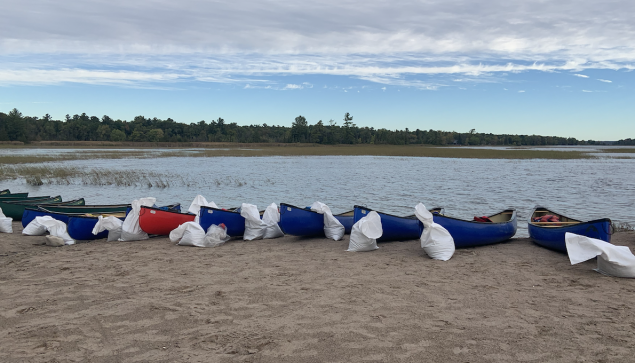At the end of May, Food Secure Canada hosted a screening of Food for the Rest of Us(link is external), a documentary style film that takes an intimate look at four local initiatives that are significantly improving the lives of their communities through food and agriculture. After the screening, we invited three changemakers – Rachel Cheng, Dimitri Esperance, and Gorana Govedarica – to participate in a discussion on the themes addressed by the film.
Having had their own unique experiences with or within local food initiatives, the three panelists spoke about the challenges, opportunities and power of such projects.
SEE THE FULL DISCUSSION
Please note that english subtitles will be added shortly. In meantime, we invite you to read the article below which reflects some of the major issues raised during the discussion.
We have also included boxes in the article below that look at these issues through a Sustainable Development Goals framework in an effort to hold our governments accountable for their actions and initiate real change.
The panelists and their involvement in the food movement
Rachel Cheng works in several community organizations, including the Montreal Restaurant Workers Relief Fund and the non-profit organization, Nourish Leadership(link is external). “Food is the lens through which I see the world,” she shares. Rachel has also launched an event series called Race x Food(link is external), which provides a platform to talk about the intersection of cultural heritages and food.
Dimitri Espérance is the co-founder and executive director of La DAL, a collective of St. Henri residents born in May 2020 thanks to a petition he launched to fight against food insecurity in the western part of the neighborhood. “It was the needs of my community that led me to take on this current responsibility,” he states.
Gorana Govedarica, moderator of the discussion, is a project manager with the Forum sur les Systèmes alimentaires territoriaux (SAT) and has been involved in the sustainable and equitable food systems community for the past seven years. She has worked and collaborated with several key players in the local and national food system, including Food Secure Canada.
Empowering the local initiatives that are transforming our food system
Food for the Rest of Us introduces us to four local food initiatives: an urban farmer’s aquaculture project in Kansas City; a community greenhouse producing fresh produce in the Northwest Territories; an internship program teaching indigenous youth how to produce food sustainably; and a woman Shochet’s workshops in Colorado that are reconnecting participants to local meat. Rachel and Dimitri, having founded or worked for initiatives with similar goals, know first-hand the challenges such projects face – and the conditions that can empower them.
When asked how such initiatives can become more prominent and impactful, Rachel mentions that a one-size-fits-all solution to food security and food sovereignty issues is not the answer. “It is essential that each food initiative or project be rooted in the community”. This “one-size-fits-all” solution is also challenged by the film.
Rachel highlights the sense of competition that exists among food non-profits due to the limited funding available to these organizations. “Yet all of these initiatives are essential and need to exist.” According to Rachel, collaboration, generosity and sharing of resources would increase the impact and ensure the sustainability of these projects.
Competition between food organizations is something that Dimitri has had to deal with since the creation of la DAL. Newer initiatives have less capital, resources and government connections to survive, let alone grow and thrive. Additional funding, along with a better understanding of the types of food initiatives that exist, can strengthen collaborations between community organizations. “To compare a grocery store – which, at the end of the day, is a business; to a food bank – which has the ability to be subsidized to receive food: it’s not the same thing.”
Takeaways
- Government must formally recognize that local initiatives are a key lever for achieving Canada's 2030 national agenda strategy, as illustrated in the film and in the panellists' testimonies.This means funding these initiatives adequately to ensure not only their survival and development, but to encourage the growth of similar initiatives.
- Many equity-deserving groups experience food insecurity disproportionately. This reality points to the structural and systemic inequalities in society at large. The SDGs specifically state the obligation to leave no one behind. We cannot achieve the SDGs without addressing the unique needs of groups of people made vulnerable by interconnected and intersectional oppressions, both nationally and globally.
- The Government of Canada has ratified the United Nations International Covenant on Economic, Social, and Cultural Rights, which places a legal obligation on Canada to guarantee its citizens the right to food. For Canada to achieve its goal of Zero Hunger (SDG 2), it must recognize and integrate the right to food into its policies and legislation through a whole-of-government approach.
Anti-racism at the core of the food movement
In its portraits of each initiative, the film considers the history of racism and colonization that brought the communities to their respective breaking points. In doing so, it highlights the insidious effects of systemic racism.
“Food is a system”, explains Dimitri, “Seeing it this way makes it possible to realize that some people benefit from it, while others are oppressed by it”.
Rachel adds that “[I]t’s impossible to change the food system without changing foundations that are racist, that discriminate against certain people.” She shares that she joined the food movement to fight climate change – but quickly realized that it’s impossible to work in food without addressing the systemic elements that harm so many people in our communities.
Recognizing food as a fundamental human right
Recognizing food as a fundamental right would imply that government would be held accountable for underfunding food organizations and the unacceptable level of food insecurity and poverty that exists today. “Either government scales up these [local food] initiatives, or empowers communities to do what should have been done in the first place,” states Dimitri.
Rachel adds that adopting a social justice lens and identifying the people, companies, and institutions that hold the most power in our society is essential to understanding how the path for a more sustainable food system can be paved. “If we all agree that no one should go to bed at night hungry, then I would like to ask those with the most resources and power how they would like to organize for our basic needs to be met”.
These have been only snippets of a larger conversation that delved deeper into the challenges and catalysers of grassroots food initiatives, the role of anti-racism in food work, and recognizing food as a fundamental human right. We encourage you to watch the video to hear more of what Rachel, Dimitri and Gorana had to say about these and more food-related issues.
If you’re still hungry for more, we invite you to take a look at the links we’ve shared in the box below or to write to us directly at juliette@foodsecurecanada.org(link sends e-mail) with questions or requests.
October 27, 2022 — 2:00 pm to 6:00 pm
Links to content referred to in the discussion
Articles, books, or videos on the intersections between food and race




